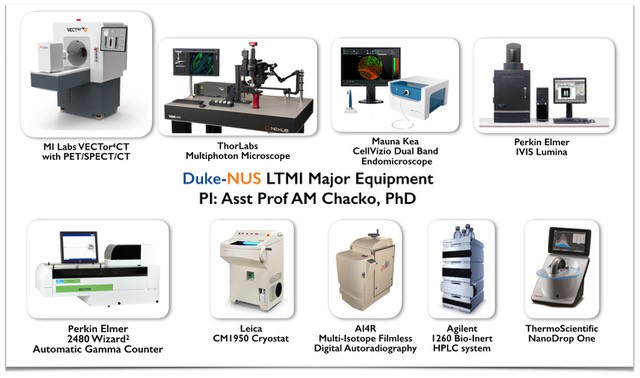Laboratory for Translational and Molecular Imaging (LTMI)
Lab Head:
Dr. Ann-Marie Chacko, PhD, Assistant Professor, Cancer & Stem Cell Biology Programme
The Duke-NUS Preclinical In Vivo Imaging Core Facility is part of Prof Ann-Marie Chacko’s Laboratory for Translational and Molecular Imaging (LTMI). LTMI advances state-of-the-art small animal imaging platforms. A major thrust of LTMI is to develop in vivo molecular imaging agents to study cancer biology, inflammation, infection, and immune function, with an Asian disease-centric focus. Located inside the specific pathogen free – SPF – barrier facility at Duke-NUS, LTMI offers in vivo platforms that permit simultaneous PET/SPECT paired with ultra-high resolution CT, bioluminescence, and fluorescence imaging. In vivo imaging is complemented with in vitro/ex vivo capabilities, including cell-based assays, biodistribution, autoradiography, and dosimetry. Companion radiochemistry is available in-house and in collaboration with nearby clinical partners. LTMI functions both as a core facility for Duke-NUS researchers and as a hub for emerging imaging research and technology development across Singapore, accessible to the broader research community including other academic institutes and industry groups through contract work and collaborations.
Services
A number of services are available to meet the various needs of investigators throughout an imaging or drug development study protocol:
- Initial consultation
- Experimental design and optimization
- Probe chemistry (conjugation/radiolabeling)
- In vitro binding and internalization
- In vitro/ex vivo autoradiography
- In vivo model development
- In vivo pharmacokinetics and pharmacodynamics
- Imaging protocols and techniques
- Post-acquisition data analysis and interpretation
- Training and staff assistance
Major Equipment

Location
LTMI has dedicated research space in Duke-NUS Medical School. This includes an in vitro laboratory room, a tissue culture room, a shared radioactive room, and a specific-pathogen-free (SPF)-1 vivarium room. Common facilities and equipment are also made available in Duke-NUS.
LTMI has an in vitro laboratory space within Duke-NUS. The 33 square meters space is set up with equipment for basic molecular work, in vitro assays and cell culture. The major equipment in this space is the Agilent Technologies’ 1260 Infinity Quaternary HPLC system that allows us to identify and quantify components of mixture. LTMI also has its own cryogenic sample storage, refrigerator, -20 °C and -80 °C freezer.
LTMI also has dedicated 70 square meter research space for all studies involving vertebrate animals inside the BSL-2 Specific Pathogen Free – SPF – barrier facility at Duke-NUS. The animal facility is fully licensed and accredited by the Association for Assessment and Accreditation of Laboratory Animal Care (AAALAC), and regulated by the Singapore Agri-Food & Veterinary Authority of Singapore (AVA). It can accommodate up to 3,200 mice, and 200 rats. The space is set up with equipment for in vivo/ex vivo imaging, radiometric detection, optical biopsies and biodistribution. The major equipment housed in this area include: VECTor4CT for tri-modalilty SPECT/PET/CT imaging, Mauna Kea CellVizio confocal endomicroscopy system, Perkin Elmer Wizard2 2480 gamma counter, and Leica CM1950 Cryostat. LTMI resources also include the ThorLabs MultiPhoton Microscope and Perkin Elmer IVIS Lumina Series Preclinical imaging system, housed separately in the vivarium. LTMI is set to install the AI4R Beaver system for multi-isotope filmless digital autoradiography system in Feb 2017.
In addition, LTMI has dedicated radiochemistry space for labeling antibodies, nanomaterials, solid-phase resins, and small molecules with radiohalogens like 125I, 124I, 131I, and 123I. The laboratory is also equipped to handle radiometals such as 90Y, 68Ga, and 89Zr, as well low-energy isotopes including 3H and 14C. The lab also contains necessary equipment for synthesis and purification of chemical ligands and is capable of radio metabolite analysis, and non-radioactive chemistry. LTMI has access and collaborations with radiochemistry teams across Singapore, including Singapore General Department Nuclear Medicine and Molecular Imaging, as well as NUS Clinical Imaging Research Centre (CIRC).
Biohazard Considerations
The research conducted in LTMI relies heavily on radioactive materials (high and low energy) and studies are conducted under the auspices of an approved NEA license. All handling and use of radioactive materials occurs behind proper shielding, and the space is monitored with dedicated probes. All personnel are trained for use and handling of hazardous materials.
Contact Information
For further enquiries or a visit to our facility, please contact Joanne Ong.